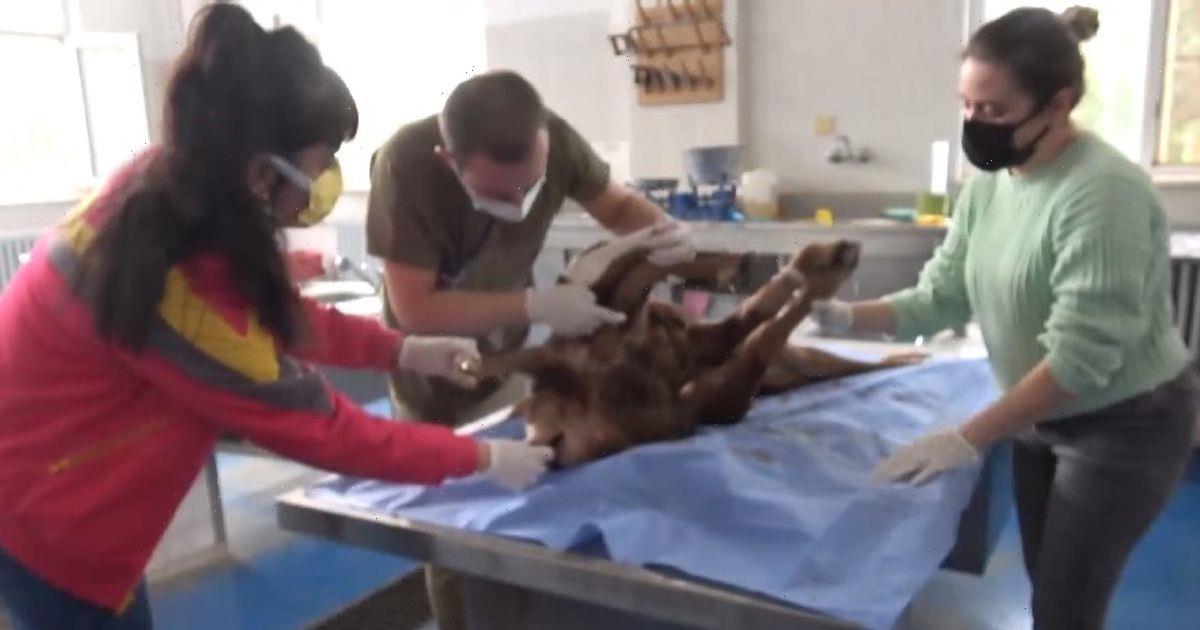Dean Stockwell, who began his acting career as a child in Hollywood’s golden age and later performed memorably in David Lynch’s “Blue Velvet”; in the comedy “Married to the Mob,” for which he was Oscar nominated; and on TV’s “Quantum Leap,” for which he was Emmy nominated, died Sunday. He was 85.
The actor racked up an extraordinary 200 credits in a career that spanned seven decades, working with notable directors including Lynch, Jonathan Demme, Robert Altman, Wim Wenders, Sidney Lumet and Francis Ford Coppola.
He picked up a supporting-actor Oscar nomination for Demme’s 1988 Mafia comedy “Married to the Mob,” starring Michelle Pfeiffer and Matthew Modine, in which he played mob boss Tony “the Tiger” Russo, who was simultaneously chilling and amusing.
One of Stockwell’s most memorable roles was as Admiral ‘Al’ Calavicci in NBC sci-series “Quantum Leap” which ran for five seasons between 1989 and 1993. The womanizing, larger than life character was the foil for Scott Bakula’s role as Dr. Sam Beckett, a physicist who engaged in space time experiments.
The role earned Stockwell four nominations for the Primetime Emmys and a Golden Globe win in 1990 for “best performance by an actor in a supporting role in a series, miniseries or motion picture made for television.” Stockwell received a star on Hollywood’s Walk of Fame on Feb. 29, 1992, the same year in which he played a disgruntled screenwriter in Robert Altman’s “The Player.”
But there were plenty of memorable performances for which Stockwell did not receive awards recognition. Among them was his bizarre turn in Lynch’s exploration of the dark netherworld that secretly lies beneath a nominally ordinary town in “Blue Velvet.” Here Dennis Hopper had the more shockingly brutal role, but Stockwell was more subtle in his creepiness as he lip-syncs to the Roy Orbison song “In Dreams.”
Writing about “Blue Velvet” in 2006, 20 years after its release, Terrence Rafferty referred to “this movie’s indelibly weird Ben, played by Dean Stockwell as the epitome of suavity.”
Stockwell had first worked for Lynch in the director’s 1984 adaptation of “Dune,” playing the treacherous Dr. Yueh who, in Stockwell’s hands, became odd but sympathetic.
The actor was also known for his role in Wenders’ 1984 classic “Paris, Texas,” in which he played Walt Henderson, who offers quiet support to his brother, Harry Dean Stanton’s Travis Henderson.
In 1988, in the wake of Stockwell’s string of successes culminating in his work in “Married to the Mob” and his portrayal of Howard Hughes in Coppola’s “Tucker: The Man and His Dream,” the New York Times ran a laudatory profile of the actor.
Describing his development from child actor to adult, the Times said, “The cherub seen scampering with a toe-tapping Gene Kelly in ‘Anchors Aweigh’ had turned into a dark, intense, charismatic leading man.”
Stockwell could play memorable oddballs or establishment figures with equal ease.
Reviewing Harrison Ford actioner “Air Force One” (1997), the New York Times said, “Dean Stockwell has a brief, amusing turn as the overly ambitious secretary of defense.”
On military courtroom drama “JAG” from 2002-04, Stockwell recurred in the role of Sen. Edward Sheffield, who becomes secretary of the Navy.
Stockwell recurred as a different kind of authority figure on the new “Battlestar Galactica” from 2006-09 as a Cylon known as Number One or John Cavil.
In 2013 Stockwell appeared in Jerry Lewis’ long-in-the-works return to film, the little-seen “Max Rose.”
Robert Dean Stockwell was born in Los Angeles to actor-parents Nina Olivette and Harry Stockwell. Dean and his older brother Guy, also an actor, made their Broadway debuts in 1943 in “The Innocent Voyage.”
MGM signed the adorable Dean to a contract, and he made his first film appearances in Greer Garson-Gregory Peck drama “The Valley of Decision” and Frank Sinatra-Gene Kelly musical “Anchors Aweigh,” both in 1945, when he was 9.
In 1947 he reunited with Peck in the classic, Elia Kazan-directed screed against anti-Semitism, “Gentlemen’s Agreement,” playing Peck’s son, who is ridiculed when others (mistakenly) think he’s Jewish. The next year he starred in another issue-oriented movie, Joseph Losey’s “The Boy With the Green Hair,” a parable about racism.
Another classic in which he appeared while still a teen was MGM’s 1949 adaptation of Frances Hodgson Burnett’s “The Secret Garden,” in which Stockwell played the crippled Colin, starring with Margaret O’Brien, Herbert Marshall, Gladys Cooper and Elsa Lanchester.
In 1949 whaling picture “Down to the Sea in Ships,” his was the character over which stars Lionel Barrymore and Richard Widmark struggle.
He also appeared in Jacques Tourneur’s powerfully moral Western “Stars in My Crown,” starred in William Wellman’s schoolboy tale “The Happy Years” and starred alongside Errol Flynn in Rudyard Kipling adaptation “Kim,” all in 1950.
During the 1950s the growing Stockwell would move back and forth between film and the new medium of television, and on Broadway he appeared in “Compulsion,” based on the Leopold & Loeb case, and he appeared in the classic 1959 bigscreen adaptation, starring Orson Welles. Stockwell and Bradford Dillman played the highly intelligent young sociopaths who murder a child to see if they could get away with it. Stockwell, Dillman and Welles shared the best actor award at the Cannes Film Festival.
During the 1960s Stockwell was appearing primarily on television, but his few cinematic forays were memorable.
In 1960 Stockwell played Paul Morel in Jack Cardiff’s highly regarded version of D.H. Lawrence’s “Sons and Lovers,” which picked up seven Oscar nominations. He appeared in Sidney Lumet’s 1962 feature adaptation of Eugene O’Neill play “Long Day’s Journey Into Night,” starring Katharine Hepburn, Ralph Richardson and Jason Robards. At the Cannes Film Festival, Richardson, Robards and Stockwell won a shared award for best actor.
Having explored the hippie subculture himself, Stockwell starred along with Susan Strasberg, Jack Nicholson and Bruce Dern in 1968’s “Psych-Out,” directed by Richard Rush and featuring elements of the burgeoning counterculture such as drugs, hippies and psychedelic music.
But otherwise Stockwell devoted his professional life during the 1960s to guest appearances on the likes of “Alfred Hitchcock Presents,” “Wagon Train,” “Dr Kildare” (on which he had a multi-episode arc as Dr. Rudy Devereux) and “Bonanza.”
The highlight of this TV work was a particularly memorable 1961 episode of “Twilight Zone,” “A Quality of Mercy,” in which he starred an American officer ordered to lead a charge against the Japanese but is then transported back in time and transformed into a Japanese officer in an analogous situation, ultimately gaining a perspective he hadn’t had before.
In 1970, when Peter Fonda bowed out, Stockwell stepped in to star in the Roger Corman-produced Lovecraftian horror film “The Dunwich Horror” (Stockwell also appeared in the 2009 TV remake). The next year he appeared in Dennis Hopper’s misbegotten “The Last Movie.” In 1972 he starred in “The Loners,” a road movie that owed a debt to “Easy Rider” in which he played a half-Native American on the run from police, and with Dennis Hopper in Henry Jaglom’s anemic 1976 antiwar movie “Tracks.”
During the decade he worked as a real estate agent for awhile.
Things started to go right again in his career — and in a big way — starting with “Paris, Texas” in 1984.
Stockwell was a longtime friend of musician Neil Young, and the pair co-wrote and co-directed the little-seen 1982 film “Human Highway.” Long an artist, Stockwell designed the cover art for Young’s album “American Stars ‘N Bars.”
He is survived by two children.
Subscribe to Variety Newsletters and Email Alerts!
Source: Read Full Article


